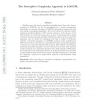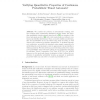1054 search results - page 179 / 211 » A Logic Language of Granular Computing |
CORR
1998
Springer
13 years 7 months ago
1998
Springer
Building upon the known generalized-quantifier-based first-order characterization of LOGCFL, we lay the groundwork for a deeper investigation. Specifically, we examine subclass...
ICFEM
2010
Springer
13 years 6 months ago
2010
Springer
Abstract. Today’s software systems are becoming increasingly configurable and designed for deployment on a plethora of architectures, ranging from sequential machines via multic...
VL
2010
IEEE
13 years 5 months ago
2010
IEEE
Many machine-learning algorithms learn rules of behavior from individual end users, such as taskoriented desktop organizers and handwriting recognizers. These rules form a “prog...
CONCUR
2000
Springer
13 years 12 months ago
2000
Springer
Abstract. We consider the problem of automatically verifying realtime systems with continuously distributed random delays. We generalise probabilistic timed automata introduced in ...
HLPPP
1991
13 years 11 months ago
1991
Swarm is a computational model which extends the UNITY model in three important ways: (1) UNITY’s fixed set of variables is replaced by an unbounded set of tuples which are add...


